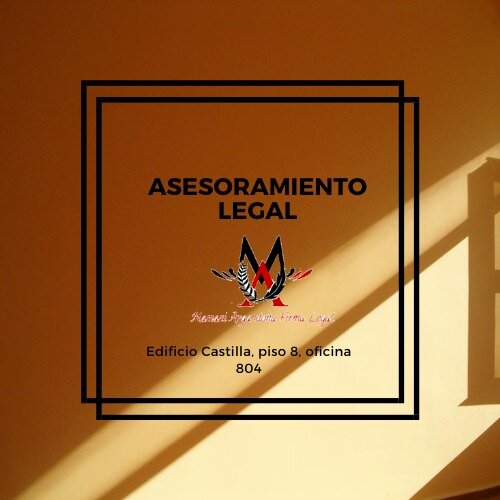Best Corporate & Commercial Lawyers in La Paz
Share your needs with us, get contacted by law firms.
Free. Takes 2 min.
List of the best lawyers in La Paz, Bolivia
About Corporate & Commercial Law in La Paz, Bolivia
Corporate and commercial law in La Paz, Bolivia, covers the rules and regulations governing companies, business transactions, and commercial relationships. These laws set out how businesses are formed, operated, merged, acquired, or dissolved, and cover a multitude of activities such as contracts, business permits, compliance, partnerships, and dispute resolution. Operating in La Paz means navigating Bolivia's national regulatory framework, with some local administrative conditions specific to the seat of government and commerce.
Why You May Need a Lawyer
Many situations in the corporate and commercial field require experienced legal guidance. You may need a lawyer if you are starting a new company and require help with legally forming your business entity, drafting articles of incorporation, or registering with Bolivian authorities. If you are entering into complex contracts, negotiating mergers or acquisitions, dealing with shareholder disputes, or addressing matters of taxation and compliance, legal expertise is essential. Lawyers can assist with intellectual property registration, employment law matters, commercial litigation, dissolutions, and regulatory issues to protect your business interests and keep you in compliance with Bolivian law.
Local Laws Overview
Bolivia’s corporate and commercial legal landscape relies on several key statutes and authorities. The Commercial Code (Código de Comercio) is the core legal framework for business activities, covering company formation, contracts, insolvency, company management and more. Local regulations require companies to register with the National Tax Service (Servicio de Impuestos Nacionales) and obtain a trade license (Licencia de Funcionamiento) from the municipality. Additionally, foreign investment laws, labor regulations, and anti-corruption rules play a major role. In La Paz, businesses must consider municipal and departmental rules on zoning, permits, and environmental compliance.
Frequently Asked Questions
What types of business entities can be formed in La Paz?
The most common business entities in Bolivia are the Sociedad de Responsabilidad Limitada (SRL - limited liability company), Sociedad Anónima (SA - corporation), partnerships, and sole proprietorships. Each type has a different structure, liability, and tax implications.
What are the main steps to register a company in La Paz?
You will need to draft bylaws, register your company at the Registry of Commerce (Fundempresa), obtain a tax identification number (NIT) from the National Tax Service, acquire a municipal operation license, and register with other relevant authorities such as social security and labor offices.
Is foreign investment allowed in Bolivia?
Yes, Bolivia permits foreign investment. However, there may be restrictions or additional steps in sectors considered strategic or sensitive. Proper legal advice ensures compliance with applicable laws.
What taxes do businesses in La Paz have to pay?
Businesses are required to pay national and municipal taxes, such as the Value-Added Tax (IVA), Transaction Tax (IT), Corporate Income Tax (IUE), and other sector-specific taxes depending on their activities.
How are commercial disputes resolved?
Disputes can be resolved through negotiation, mediation, arbitration, or litigation in the courts. Bolivia recognizes commercial arbitration as an option, and the courts in La Paz have jurisdiction over local disputes.
Are there special labor laws affecting companies in La Paz?
Yes, Bolivian labor law is pro-worker and has strict regulations regarding employment contracts, social benefits, minimum wages, severance pay, and dismissals. All businesses must comply with these protections.
What permits and licenses are required to operate a business?
Businesses commonly require a municipal operation license, sector-specific permits, environmental clearances (where applicable), health and safety certificates, and registration with tax and social security authorities.
How long does it take to register a business in La Paz?
The timeline can vary, but generally, it takes two to four weeks to complete all registration steps, provided that all documentation is in order and there are no unusual delays.
Can a business operate without a physical office in La Paz?
Most local regulations require businesses to have a registered address in La Paz. Some activities may allow for virtual offices, but permits and tax registration will typically require a physical location.
Are there legal requirements regarding company governance?
Yes, companies must follow corporate governance rules, including holding regular shareholder meetings, bookkeeping, recordkeeping, and reporting. There are also specific requirements for board composition for some entities.
Additional Resources
You can obtain further guidance from several governmental bodies and organizations in Bolivia:
- Registro de Comercio (Fundempresa) for company registration
- Servicio de Impuestos Nacionales (SIN) for tax matters
- Ministerio de Trabajo for labor-related issues
- Gobierno Autónomo Municipal de La Paz for municipal permits and licenses
- Cámara Nacional de Comercio for business networking and resources
- Bolivian Bar Association for finding certified lawyers
Next Steps
If you need legal assistance in corporate and commercial matters in La Paz, it is advisable to:
- Gather all relevant documents or information regarding your business or legal question
- Identify the specific issue or area where you need support, such as incorporation, contracts, permits, or dispute resolution
- Consult a qualified lawyer who specializes in corporate and commercial law in Bolivia
- Verify the lawyer's credentials with the Bolivian Bar Association
- Ask for an initial assessment or consultation to understand your options and possible costs
Lawzana helps you find the best lawyers and law firms in La Paz through a curated and pre-screened list of qualified legal professionals. Our platform offers rankings and detailed profiles of attorneys and law firms, allowing you to compare based on practice areas, including Corporate & Commercial, experience, and client feedback.
Each profile includes a description of the firm's areas of practice, client reviews, team members and partners, year of establishment, spoken languages, office locations, contact information, social media presence, and any published articles or resources. Most firms on our platform speak English and are experienced in both local and international legal matters.
Get a quote from top-rated law firms in La Paz, Bolivia — quickly, securely, and without unnecessary hassle.
Disclaimer:
The information provided on this page is for general informational purposes only and does not constitute legal advice. While we strive to ensure the accuracy and relevance of the content, legal information may change over time, and interpretations of the law can vary. You should always consult with a qualified legal professional for advice specific to your situation.
We disclaim all liability for actions taken or not taken based on the content of this page. If you believe any information is incorrect or outdated, please contact us, and we will review and update it where appropriate.
Browse corporate & commercial law firms by service in La Paz, Bolivia
La Paz, Bolivia Attorneys in related practice areas.















